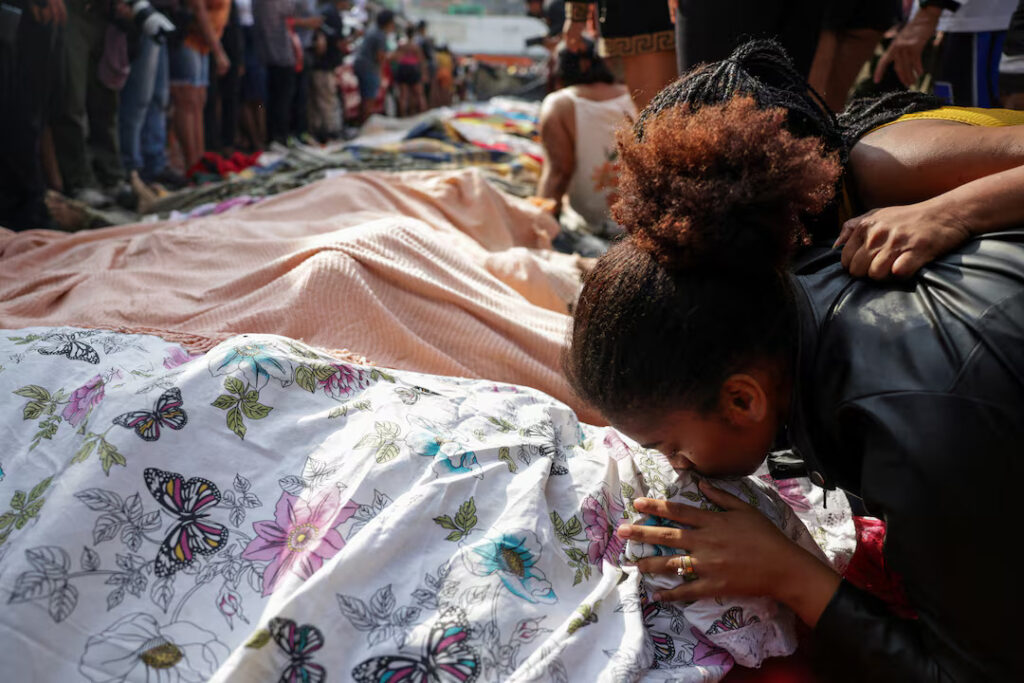At least 121 people were killed in Brazil’s deadliest police operation on record, authorities said on Wednesday, after residents of Rio de Janeiro’s Penha neighborhood lined a street with dozens of bodies recovered from surrounding forests overnight.
The massive raid, which targeted the powerful Comando Vermelho drug gang, was described by Rio state officials as the culmination of more than two months of planning. Police said the operation aimed to trap suspects in a forested hillside, where special forces units waited in ambush.
“The elevated lethality of the operation was expected but not desired,” said Victor Santos, Rio’s head of public security, at a news conference. He promised investigations into any police “misconduct.”
Rio’s civil police confirmed 121 deaths, including four officers, while public defenders said the toll could rise to at least 132. Authorities also reported the arrest of 113 suspects and the seizure of 118 firearms.
President Luiz Inácio Lula da Silva condemned the persistent drug violence but urged police to act with restraint. “We cannot accept that organized crime continues to destroy families, oppress residents, and spread drugs and violence throughout our cities,” Lula wrote on X.
In the Penha district, grief and outrage spilled into the streets. Residents arranged more than 70 corpses along a main avenue, many covered with sheets or plastic bags, as families searched for missing loved ones. “I just want to take my son out of here and bury him,” said Taua Brito, a grieving mother surrounded by mourners.
Later in the day, a motorcycle caravan and hundreds of demonstrators marched to the Rio governor’s palace, waving Brazilian flags marked with red handprints to protest what they called “state-sponsored massacres.”

Warning Graphic Content: A mourner kisses a covered body, the day after a deadly police operation in Rio de Janeiro. REUTERS/Ricardo Moraes
Human rights groups and the United Nations condemned the scale of the killings. “We remind authorities of their obligations under international human rights law, and urge prompt and effective investigations,” the UN human rights office said.
Lawyers representing victims’ families said many bodies showed signs of torture and execution-style killings, including bound limbs, knife wounds, and gunshots to the head. “Several families reported signs of torture on the victims’ bodies,” said Guilherme Pimentel, a human rights attorney assisting families at the city morgue.
Rio Governor Cláudio Castro, however, defended the operation, claiming those killed were armed gang members. “I don’t think anyone would be walking in the forest on the day of the conflict,” he said, calling the raids a battle against “narcoterrorism.”
The state government said the operation was its largest ever against Comando Vermelho, which dominates drug trafficking across several of Rio’s favelas, densely packed, impoverished communities that sprawl across the city’s hillsides.
The death toll surpasses the 2021 Jacarezinho raid, in which 28 people were killed, and even exceeds the 1992 Carandiru prison massacre in São Paulo, where 111 inmates died.
Justice Minister Ricardo Lewandowski said at least 50 federal police officers would be deployed to Rio to assist in the fight against organized crime. Santos insisted the timing of the violence was unrelated to global events Rio is set to host next week, including climate summits linked to the UN COP30 and the Earthshot Prize.
As investigators comb through the aftermath, residents of Penha remain shaken, mourning the dead, demanding justice, and questioning whether Brazil’s war on drugs has once again claimed more civilian lives than it has saved.
Source: Reuters
Written By Rodney Mbua